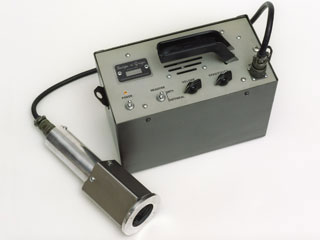| Thursday, June 9, 2005 |
| Corporate Fallout Detector |
 James Patten: James Patten:The Corporate fallout Detector scans barcodes off of consumer products, and makes a clicking noise based on the environmental or ethical record (selectable via the "sensitivity" switch) of the manufacturer. It explores issues of corporate accountability and individual choice. Due to increasingly complex global supply chains, a single product we buy may contain parts made by various companies all over the world. We may agree with the business practices of some of these companies, while not with others. The complexity of the relationships between manufacturers can be so great that it becomes unclear how to translate our personal convictions into good buying decisions, and all purchasing decisions involve an unavoidable element of risk. For example, a consumer may know that one company has a good record on human rights and pollution, but that company may be owned by another company that has a poor record in these areas. When one buys from the smaller company, the parent company also benefits. In this case, what should a consumer do to reward good business ethics? One can argue either for buying or boycotting products from the smaller company. Yeah, it isn't simple. Would be nice if it was as simple as a red light or green light. But really the thing is that we need to be better informed. We need better ways of visualizing complexity, so that we'll bother paying attention to it. I don't know how real that geiger counter thing is. It is a couple of years old and have been displayed at some festivals and gotten some mentions, but it is probably more like an art project, meant to call attention to the issue. [ Knowledge | 2005-06-09 01:49 | 4 comments | PermaLink ] More > |
| Ransom economics |
Collision Detection talks about a different way of publishing. A couple of board game designers wanted to publish a game online in PDF format, but were worrying about not getting paid, because people easily could pirate their work. So they thought about a new way of doing it.Last December, Stolze and Holis invented what they call "the ransom model". It works like this: They described the basic gist of the game on their web site, and set a ransom of $600 for it. If they received $600 in donations by September 2005, they would finish creating the game -- and then release it on their site, for anyone to download for free. (If they didn't get the full $600 in time, they would donate whatever money they'd received to a homeless shelter.) As they explained, the ransom model is a win-win for lots of reasons: I had actually thought about such ideas as a possibility for how one would finance large scale projects in grassroots economies. Like, if we all were trafficking in alternative currencies that weren't issued by banks or governments, and if there weren't huge corporations on the stock exchange, and we maybe even arranged for most things to be free, how would we get bridges built, and how would expensive movies get made? It isn't unfathomable that the same approach could be used, with some refinements. Essentially you would put out your proposal, what you would like to do, and what you think it would cost. And people would examine it, and they would examine your reputation for doing good things. And then they would vote with their currency, in advance, before the product gets made. If enough people think it is worthwhile, it gets made. If not, it doesn't. I bet Star Wars would easily have been financed that way. And the war in Iraq wouldn't. And we'd have space elevators and expeditions to Mars much faster. [ Culture | 2005-06-09 02:12 | 8 comments | PermaLink ] More > |
| Off to Reboot |
| So, I leave for Copenhagen this afternoon for the Reboot conference. Many good people I know or have met before on the list of participants: Martin Roell, Felix Petersen, Lee Bryant, Loic Le Meur, Doc Searls, Ton Zijlstra, Elmine Wijnia, Jacob Friis Larsen, Dina Mehta and more I'm forgetting. And people I'd really like to meet. Like Thomas Madsen Mygdahl who organizes the conference. And Stuart Henshall, Ben Hammersley, Matt Webb, and, well, many others.
It is one of these techie conferences where everybody brings their Mac laptops, and there's wi-fi, and we sit and chat and make collaborative notes and write blog entries and surf the web while people are speaking. So no chance of being bored. My powerbook has been behaving oddly recently, like some piece of hardware is just on the verge of failing, but I'll take the chance and bring it anyway. I mean, I'd be an outcast who'd have to sit in the back and hide my face if I weren't wired. And, if my server just will stay up, everything will be fine. It crashed twice today. Its been getting more traffic recently, so either it is the huge amounts of spam mail, or I'll need to optimize the databases more. [ Diary | 2005-06-09 02:43 | 3 comments | PermaLink ] More > |